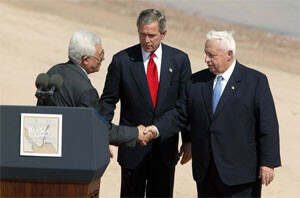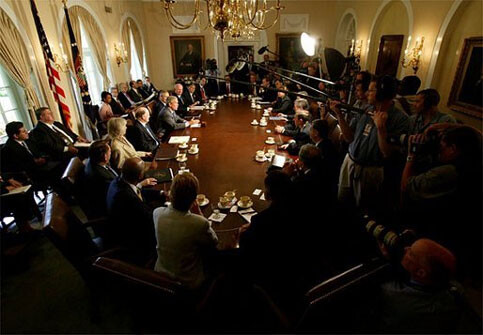The Electronic Intifada 11 June 2003

Above: Palestinian protesters have been less than impressed with the roadmap, insisting that it is Israel that has to take the first steps and dismantle settlements.(Musa Al-Shaer)

Above: Palestinian Prime Minister Mahmoud Abbas, President George W. Bush and Israeli Prime Minister Ariel Sharon after reading statement to the press during the closing moments of the Red Sea Summit in Aqaba, Jordan Jun 4, 2003. (White House/Paul Morse)
The world will certainly consider the two Palestinian attacks on Israeli positions, Sunday in Hebron, where the Palestinian attacker and one Israeli were killed, and at the crossing point of Beit Hanoun (Erez), where the three Palestinian attackers and four Israeli soldiers were killed, as the proof that Hamas is living up to its promise. Further confirmation came from Abdul Aziz Rantisi, who described the attacks as a message to Abbas that the Palestinians will continue to fight Israeli occupation and will not “surrender to the pressure exerted by Israel and the United States”.
Apart from the certainty that the world will again ignore, and unduly overlook, provocative Israeli attacks and incursions on the Palestinians and jump fast to the usual conclusion that it is the Palestinian violence that threatens the roadmap, therefore putting any failure squarely on the Palestinian shoulders, this adds another major problem to the already untenable position of the newly appointed Palestinian prime minister.
The unexpectedly strong US reaction to Israel’s subsequent attempt to kill Rantisi, which President Bush called “deeply troubling” may only delay ultimate blame on the Palestinians if Sharon succeeds in derailing the road map completely.

Above: President George W. Bush addresses the media during a Cabinet Meeting. Recent Israeli attacks in Gaza that claimed the lives of Palestinian civilians have embarrassed the White House but Israel is unlikely to be reined in any time soon. (White House/Eric Draper)
In the face of mounting obstacles, Abbas seems to be losing the initiative faster than expected. Already known for conceding too much to the Israelis, as his notorious and widely unpopular agreement with Yossi Beilin in 1995 bears witness, his recent statement in Aqaba has stirred severe criticism, and indeed shock, amongst the Palestinians who increasingly find themselves threatened not only by their enemies but, more painfully, by a leadership which continues to offer their inalienable rights as concessions to their hostile occupiers.
The Palestinian leadership seems only capable of acting either to appease Israel and the US or to timidly succumb to their pressure, instead of defending the legitimate rights of their people and standing up firmly for them, as the Palestinian victims of half a century of aggression and persecution would rightly and justly expect their leaders to do.
Most of the criticism of the Abbas Aqaba statement revolved around:
(1) His commitment to unconditionally stop the Intifada, acquiescing to the concept that legitimate resistance to occupation is to be condemned and banned as terrorism;
(2) His tacit submission to the scrapping of the right of return, by excluding any reference to it in his statement. Although he refrained from including in his recognition of the right of Israel to exist the newly required addition of: “as a Jewish state”, the emphasis of the new point by both Sharon and Bush is alarming;
(3) His ill-advised negligence to stress the ongoing suffering and the agony of his own people and the historic injustice imposed upon them while, at the same time, expressing sympathy only for the Jewish suffering;

Above: A Muslim Palestinian girl prays in front of the Dome of the Rock in the Al-Aqsa mosque compound in the Old City of Jerusalem. (Musa Al-Shaer)
(5) His noted failure to seize such an important occasion to combine with his commitment to the goal of peace and to banning violence the appropriate reaffirmation of the just basis on which such peace can be built, including the legitimate national rights of the Palestinians, as defined and as recognised by international law and the relevant UN resolutions; and
(6) His offering of all this without getting anything in return, except the promise of removal of “unauthorised outposts”, a meagre offer which removes the only positive element the roadmap included: the required freeze on settlement activity and the removal of all new settlements built since March 2001.
It is hard to imagine how Abbas will be able to overcome this impasse. But even if he does settle his difficulties with his own people, that will only help him advance towards the next roadblock, which will be much harder, almost impossible, to cross: the Israeli position. Sharon’s intent to kill the roadmap is already well known, as are his tactics to utilise any Palestinian fault, should they volunteer one (ideally for Sharon a suicide attack). The attempted murder of Rantisi, and the subsequent Israeli attack which killed three Palestinian civilians in northern Gaza are only the latest examples of Sharon’s method of attempting to provoke Palestinians responses in order to free Israel from pressure.
If these tactics fail — and the initial US response suggests they may — Sharon will resort to the handy claim that no matter how much the Palestinians do by way of curbing “terror”, it would never be enough. They would have to do more, and more, and endlessly more, until they run out, find themselves against the wall and are declared in “material breach” of the roadmap.
Israel had already included in its reservations on the roadmap a clause that it should itself evaluate the Palestinian measures on the issue of “dismantling terror”, and decide if they are adequate. The risk, therefore, for the Palestinians in particular, of shifting the goal from advancing towards a just and reasonable peaceful settlement to merely mobilising every possible effort to avoid responsibility for failure is both realistic and scary. It is also a derailment into another blind alley.
This is so similar to what happened to prewar Iraq, when “good advice” was descending on Baghdad from friend and foe alike that the leaders there should never refrain from doing anything or hesitate from meeting any demand in order to deprive those targeting them for attack of any pretext to justify their mischief, while, ironically, knowing full well that war was inevitable. It sounds rather peculiar that similar wisdom is being volunteered to the Palestinians to protect their position from possible blame, at the high price of their blood and rights, rather than protecting those rights from definite erosion, while, again, knowing well that the roadmap, with or without the Israeli attached conditions, is not a recipe for progress. Neither was it intended to be so.
More peculiar is the phenomenon that the Palestinian Authority seems to learn its mistakes, rather than learn from them. The roadmap, which it rushed to adopt just to act obediently, and which is no more than an awful version of the failed, and indeed disastrous, Oslo experiment, is bound to only extend the agony of both the Arabs and the Israelis and to engulf them both in more bloody violence. Its authors made no attempt to avoid any of the very serious faults which led to the collapse of the Oslo process, and with serious complications.

Palestinian Prime Minister Mahmoud Abbas. (PASSIA)
More injustice and more pain, even when accepted by the victims’ leaders, do not constitute good basis for building peace. They only deepen the wounds and sow more seeds of bitterness and violence. Has the time not come, if the calls for democracy mean anything, to stop choosing leaders for the Palestinians, allow them, for a change, to speak for themselves, and listen to what they may have to say?
The writer is former ambassador of Jordan to the UN.





